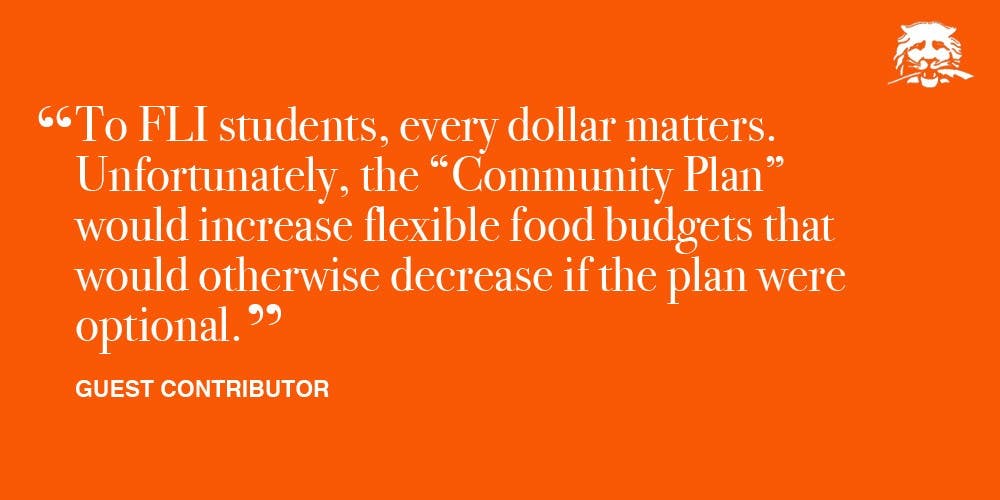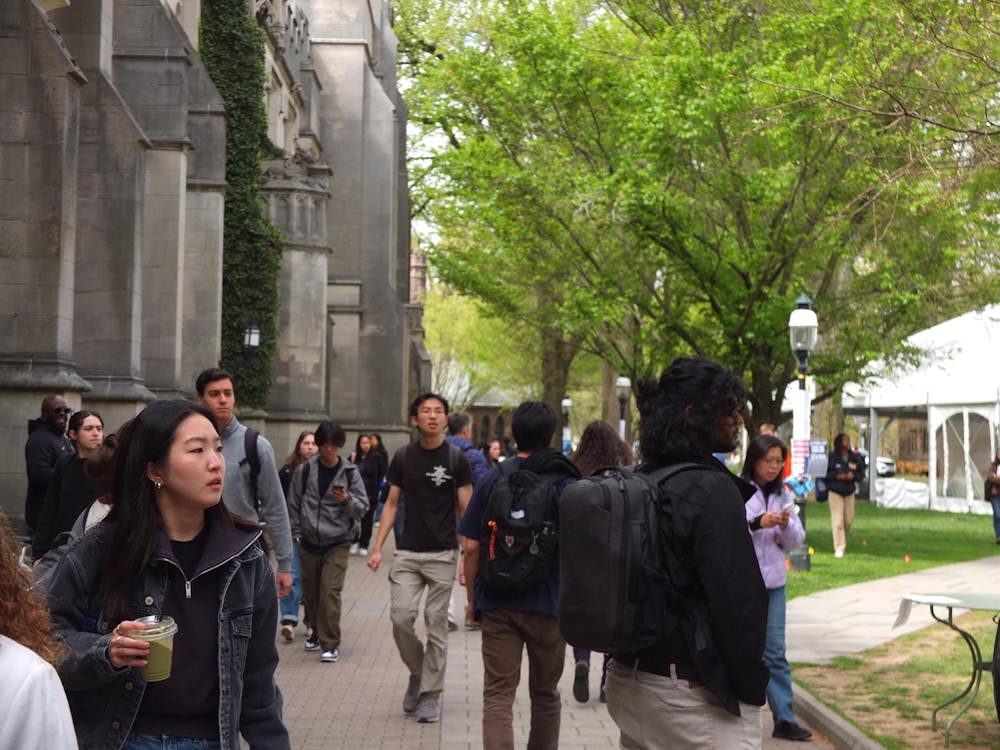The Board Plan Review Committee’s draft of proposed changes to the University’s dining plan claims they will create “more flexibility, affordability, and efficiency for an increasingly diverse community.”
In reality, these changes would restrict social life, reduce affordability, and burden diverse communities. In particular, the “Community Plan” would disproportionately impact first-generation and low-income (FLI) students.
Despite the “Community Plan’s” intention to foster an upperclassman community within the residential dining halls, it will ultimately hurt FLI students by forcing them to spend $2500 of their $8870 stipend on a mandatory meal program.
Purchasing the “Community Plan” would require upperclassmen to budget 105 meals per semester at $10.71 each, the plan’s price per meal, which dwarfs other affordable options on Nassau Street. For students who eat twice per day, the “Community Plan” would constitute about 50 percent of their semester meals (assuming 15 weeks which includes breaks, reading period, and final exams), and eating three times per day would amount to about 33 percent.
To FLI students, every dollar matters. Unfortunately, the “Community Plan” would increase flexible food budgets that would otherwise decrease if the plan were optional. For example, spending an average of $8 per meal over a semester amounts to $1,680 for two meals per day and $2,520 for three meals per day. Under the same budget with the “Community Plan,” these upperclassmen would spend a total of $1,965 for two meals per day and $2,805 for three meals per day each semester.
While the addition of 250 dining points grants more value per food dollar if used outside dining halls, this value does not necessarily translate into actual money. Instead of enforcing a mandatory meal plan, the proposal should simply increase the annual stipend and allow upperclassmen to manage their own food budgets. With more control over their finances, FLI upperclassmen can allocate funds otherwise spent on overpriced dining hall meals on textbooks, dorm supplies, storage fees, winter clothing, and other necessary expenses.
Implementing the “Community Plan” would also further worsen disparities between social groups. While some upperclassmen can simply purchase their meals elsewhere, FLI students do not share this same privilege. Their already tight budgets will be constrained further if they do not use every single “Community Plan” meal swipe, instigating guilt over having wasted money if leftover swipes remain.
The looming need to use all of one’s “Community Plan” swipes may cause some FLI upperclassmen to forgo events, activities, and opportunities to socialize outside of the dining halls to ensure they use every swipe.
Adhering to the “Community Plan” would create less flexible and diverse dining options. Enabling upperclassmen from differing backgrounds to congregate in spaces otherwise not afforded by the rigid dining hall system fosters community is a crucial element to FLI students’ personal and academic success.
But the “Community Plan” breaks up tight-knit communities in favor of filling up the dining halls. The supposedly “independent” students will become dependent on the University’s dining system, which will lead to fewer social spaces emerging to meet the needs of an increasingly diverse student population.
Furthermore, FLI upperclassmen cannot afford to waste time accommodating their independent research and career searches around dining hall hours. The proposed plan touts extended dining hall hours as a replacement for late meal, but this overlooks the importance of late meal’s flexibility to students whose schedules do not center around their residential colleges. Plus, it may lead to more overcrowded dining halls, a detriment to both upperclassmen and underclassmen.
While bridging the gap between upperclassmen and underclassmen communities should remain a goal, it should not be achieved by hindering upperclassmen from completing their graduation duties. The University should be granting students more choices and liberties with their academic and social lives, not restricting them.

Other proposed changes in the dining plan would also negatively affect underclassmen. For example, unless the University ensures all students receive financial aid packages which cover full board, the proposal to force all underclassmen to purchase the unlimited meal plan would harm those who do not qualify for a complete financial aid package.
If the Board Plan Review Committee is truly concerned about flexibility, they should not make any meal plan mandatory. Affordability can be addressed by simply increasing the annual stipend or granting more free meal swipes. Quality of life should not be sacrificed for supposed efficiency, which keeps costs down for the University while negatively impacting the most vulnerable student populations.
Signed,
Alumni co-founders of the Princeton Hidden Minority Council
Kujegi Camara ’16
Thomas Ray Garcia ’16
Julie Kwong ’16
Kevin Lopez ’16
Dallas Nan ’16
Tula Strong ’15
Lea Trusty ’16
Brittney Watkins ’16









